SCIENTIFIC LITERACY AND USE OF DIGITAL TECHNOLOGIES IN SCIENCE TEACHING: A CASE STUDY FROM THE SPECIAL EDUCATION PERSPECTIVE
DOI:
https://doi.org/10.22481/rbba.v13i01.14554Keywords:
Scientific Literacy, Special education, Digital technologiesAbstract
students understand the world around them, as well as making them critical citizens. Therefore, it is necessary to adopt aspects of scientific literacy at all stages of the schooling process and, even more so, adopt it in the inclusive context. Thus, the objective of this work is to share the results obtained in an investigation carried out with a Special Education student with Autism Spectrum Disorder, in the context of an interdisciplinary didactic sequence, guided mainly by the use of technology for the purpose of producing educational material. scientific divulgation. To this end, Sasseron and Carvalho (2011) was used as a theoretical reference, with this work being configured as a report of classroom experience. It is also noteworthy that the results obtained promoted a reflection on the benefit of using didactic sequences capable of minimizing learning difficulties for students with disabilities, providing the opportunity to work on content according to standards of interest to the student.
Downloads
References
ASSOCIAÇÃO BRASILEIRA DO AGRONEGÓCIO DE RIBEIRÃO PRETO. Agronegócio Sua Vida Depende Dele. Ribeirão Preto, 2020. Disponível em: https://www.youtube.com/watch?v=V4bKd3HjCkE. Acesso em 11 set./2023.
BRASIL. Dados Estatísticos - Pesquisas demográficas. Ministério dos Direitos Humanos. Brasília, 2017. Disponível em: https://www.gov.br/produtividade-e-comercio-exterior/pt-br/images/REPOSITORIO/scs/decos/Informativo_2017/158a_Informativoa_daa_Secretariaa_dea_Coma_rcioa_ea_Servia_oa_2017.pdf. Acesso em: 26 nov. 2023 BRANDÃO, C.R.; BORGES, M. A.C. Pesquisa participante: um momento da educação popular. Revista de Educação Popular, Uberlândia, v. 6, n. 1, 2008. CHASSOT, Attico. Alfabetização científica: uma possibilidade para a inclusão social. Revista brasileira de educação, p. 89-100, 2003.
FIGUEIREDO, S.L.; SILVA, E.F. Desafios do Fazer Docente nas Salas de Recursos Multifuncionais (SRM). Psicologia: Ciência e Profissão, v. 42, p. e230191, 2022. GALLO, S. Transversalidade e educação: pensando uma educação não disciplinar. In: ALVES, Nilda (org.). O sentido da escola. Rio de Janeiro, DP&A Editora, p. 17-43, 1999.
LUDKE, M., ANDRÉ, M. Pesquisa em educação: abordagens qualitativas. São Paulo: EPU, 1986. MARTINS, Z. As TIC no ensino-aprendizagem da Matemática. In: CONGRESSO INTERNACIONAL GALEGO-PORTUGUÊS DE PSICOPEDAGOGIA, 10, 2009, Minho, Anais [...]. Minho: Universidade do Minho. Portugal. 2009, p. 2727-2742. OMODEI, J.D.; RINALDI, R.P.; SCHLÜNZEN, E.T.M. Uma análise dos recursos disponíveis nas Sala de Recursos Multifuncionais: foco nos estudantes com deficiência intelectual. Revista Entreideias: educação, cultura e sociedade, v. 7, n. 2, 2018. PEDRO, K. M. Softwares educativos para alunos com deficiência intelectual: planejamento e utilização. 2012. Dissertação (Mestrado em Educação) – Faculdade de Filosofia e Ciências, Universidade Estadual Paulista, Marília, 2012. ROSA, M.B.F.; FREITAS, C.G.C.; ROSA, V.F. Tecnologia assistiva e tecnologia social: análise dos limites da relação entre ambas. Revista Tecnologia e Sociedade, v. 16, n. 40, p. 1-17, 2020. SASSERON, L.H. Alfabetização científica, ensino por investigação e argumentação: relações entre ciências da natureza e escola. Ensaio Pesquisa em Educação em Ciências (Belo Horizonte), v. 17, p. 49-67, 2015. SASSERON, L.H; CARVALHO, A.M.P. Alfabetização científica: uma revisão bibliográfica. Investigações em ensino de ciências, v. 16, n. 1, p. 59-77, 2011. UNESCO. Declaração de Salamanca. Sobre Princípios, Políticas e Práticas na Área das Necessidades Educativas Especiais. Espanha, 1994. XAVIER, M. F.; ALVES RODRIGUES, P. A. Alfabetização científica e inclusão educacional: ensino de ciências para alunos com Transtorno do Espectro Autista. Cadernos do Aplicação, Porto Alegre, v. 34, n. 2, 2021.
WORLD HEALTH ORGANIZATION. International Classification of Functioning, Disability and Health. Disponível em https://www.who.int/classifications/international-classification-of-functioning-disability-and-health. Acesso em: 26 nov. 2023.
Downloads
Published
Issue
Section
License
Copyright (c) 2024 Revista Binacional Brasil-Argentina: Dialogue between the sciences

This work is licensed under a Creative Commons Attribution 4.0 International License.












